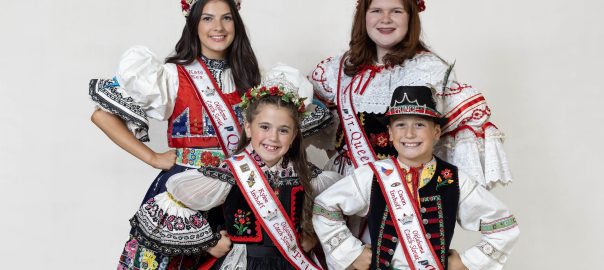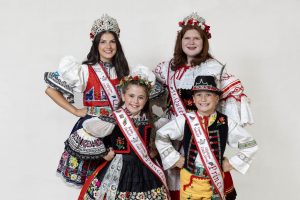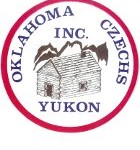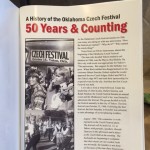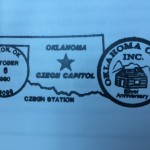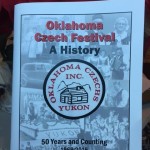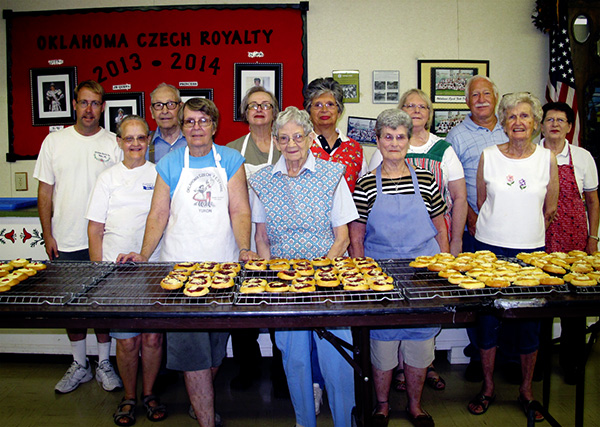Bohemian Knights Band
George Miskovsky Band played before WWII. Much of the music used today has his name stamped on the front of the sheet music.
Milo Belsky and his brothers started playing after brother Joe got out of the Army. Joe played alto sax, Milo played trombone, and Charlie played sax and trumpet. Paul Smith started playing trumpet with the band when he was fourteen years old. Charlie picked him up and drove Paul to the dances. Jerry Kaplan played tenor sax and accordion, Jim Masopust played drums, and Speedy Walker played piano.
The Belskys owned a refrigeration manufacturing business and many floral units, walk in units and beer cases are still working. When Milo’s trombone slide was sticking, he just poured beer down the tube and the slide started working. He drank the rest of the beer. Milo obtained the baby grand piano from the officer’s club at Fort Sill in Lawton. It is still used today on the Czech Hall stage. After brother Joe passed, Milo retired and Charlie Belsky directed the band. He later called the band the Polka Stars. Then in 1958, Jerry Kaplan directed the band and changed the name to the Jerry Kaplan Orchestra. His daughter Joyce played piano and was the vocalist. John Simpson ran the band after Jerry passed.
In 2004, Milo Shedeck took over the band and named it The Bohemian Knights in honor of Toni, Charlie Belsky’s widow. Milo plays sax and clarinet. Milo found a world class accordion player named Dick Albreski and his band can play all types of music with most of the sheet music arrangements done by teacher and accordionist Albreski. He is originally from Erie, Pennsylvania. His other players are: Kenneth Leck on drums, Mike Nielsen and Mark Guinn on trumpet, and Neal Hickerson on tenor sax. His other players have been Paul Smith, Mike Forcina, Cory Johnson, Scott Shedeck and Bob Bright on trumpet, Tim Hanna on tuba, Scott Rohr on drums, and Ken Elliott on tenor sax. Milo Shedeck also played in the Belsky, Kaplan, Vitek, and Masopust bands.
Other local bands that have played at the Czech Hall have included: George Miskovsky, Bob Vitek, Ed Novey, Ernie Divis, John Simpson, Charlie Rolivich, and Bessie Masopust . Paul Smith played in all the above Bands except the original George Miskovsky Band.
The Masopust Polka Band
Specializing in Czech polkas, waltzes, and specialty dances, is a family band that traces back five generations to the year 1890.
Circa 1890, Czechoslovakian immigrants, Joseph and Katheren Masopust, came to Oklahoma from Nebraska, settling in the central portion of the territory (around the Mustang area).
Joseph Masopust, along with his sons, James Joe, Frank, and Lou, and also family friend and neighbor, George Kralik (the same married Annie Hubatka), formed the first Czech polka brass band, namely, The Masopust Polka Band. This was the first generation of the Masopust family to carry the band.
Joe Masopust, the eldest son of James, reorganized the band in the mid-1920’s, adding drums, piano, and a variety of traditional and contemporary music of the time. The band’s pianist, Bessie Drabek, and Joe were married in 1927. The band was carried on by Joe, Bessie, and their son, Glenn, who played the trumpet. This was the second generation of the Masopust family to carry the band.
In 1975, David Masopust joined the band as the tuba player. David’s joining of the band marks the fourth generation of the Masopust family to be a band member. (There were no members from the third generation of the family.)
After Joe Masopust passed in 1978, Bessie continued the work of driving the band forward. Under her leadership, the band produced two albums: the self titled album in 1981, and Phase II in 1992. Bessie passed away in 1997. David Masopust then became the fourth generation of the Masopust family to carry the band.
In 1996, William “Bill” Masopust, son of David and great-great-grandson of Joseph, joined the band as the drummer. That brought the band to the fifth generation of the Masopust family.
As of now, this is not the end, as the sixth generation of the Masopust family has been born.


